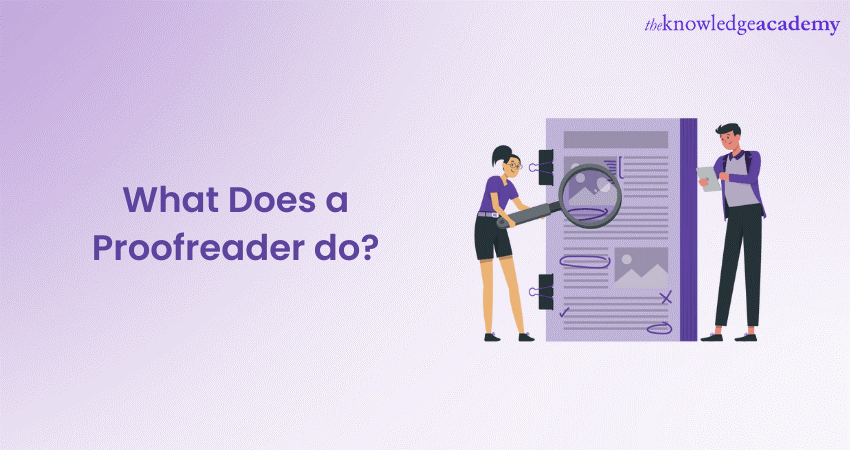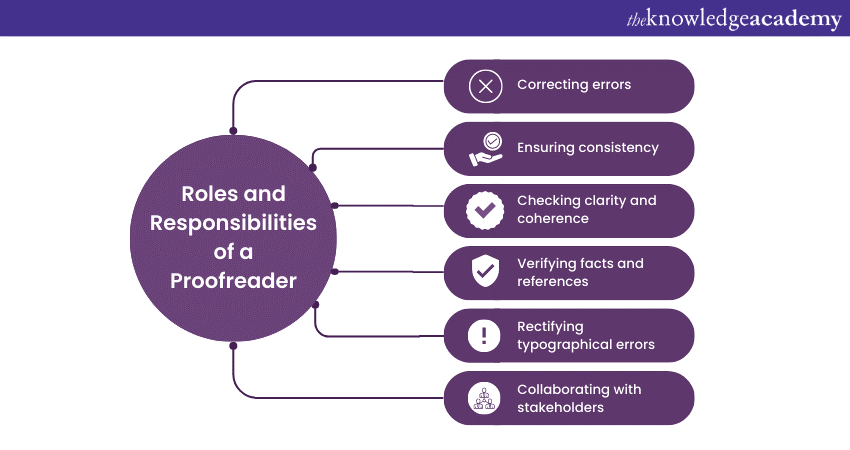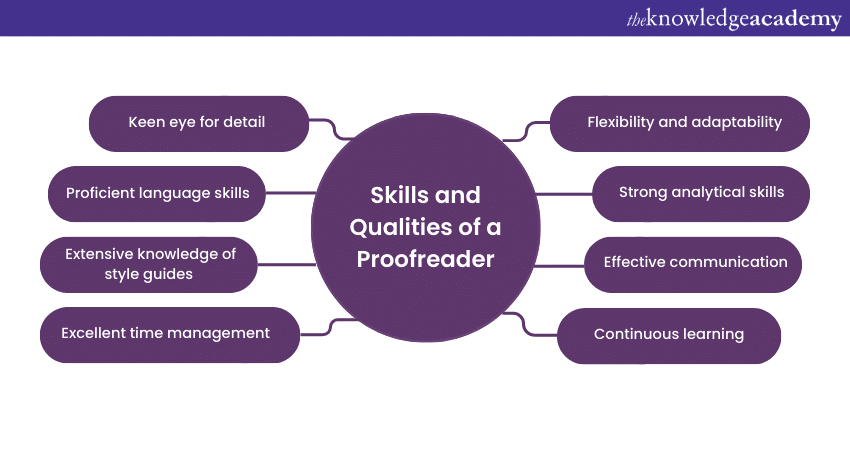We may not have the course you’re looking for. If you enquire or give us a call on 0800 446148 and speak to our training experts, we may still be able to help with your training requirements.
Training Outcomes Within Your Budget!
We ensure quality, budget-alignment, and timely delivery by our expert instructors.

In the realm of professional writing, ensuring error-free and polished content is paramount. This is where the role of a Proofreader becomes indispensable. A Proofreader plays a crucial part in enhancing the quality of written materials, ensuring accuracy, coherence, and clarity. In this blog, we will dive into What Does A Proofreader Do, including the roles and responsibilities, skills, and qualities of a Proofreader.
Table of Contents
1) Who is a Proofreader?
2) What Does A Proofreader Do?
3) Skills and qualities of a Proofreader
4) Tips for aspiring Proofreaders
5) Conclusion
Who is a Proofreader?
A Proofreader is a language expert who meticulously reviews written content to detect and correct errors in grammar, punctuation, spelling, and syntax. They act as the last line of defence before a piece of writing is published or distributed, ensuring that it is polished and error-free. Proofreaders possess a keen eye for detail and an in-depth understanding of language rules and conventions.
What Does a Proofreader Do?
This blog section will dive deeper into What Does A Proofreader Do, dissecting the roles and responsibilities of a Proofreader.

1. Correcting errors
One of the primary responsibilities of a Proofreader is to identify and rectify errors in grammar, spelling, punctuation, and syntax. They meticulously comb through the text, carefully scrutinising each word, sentence, and paragraph for any inconsistencies or mistakes.
2. Ensuring consistency
Maintaining consistency in writing style, formatting, and tone is vital for producing professional and coherent content. A Proofreader ensures that the document adheres to the designated style guide or specified requirements. They make sure that headings, subheadings, bullet points, numbering, capitalisation, and other elements are consistent throughout the text.
3. Checking clarity and coherence
A Proofreader assesses the clarity, coherence, and logical flow of ideas in the text. They ensure that sentences and paragraphs are well-structured, ideas are presented logically, and transitions between different sections are smooth. They also look out for any ambiguities or confusing passages that may hinder the readers' understanding.
4. Verifying facts and references
In certain types of writing, such as academic papers or journalistic articles, accuracy is crucial. Proofreaders verify the accuracy of facts, figures, and references cited within the document. They cross-check the information against reliable sources and ensure that proper citation and referencing formats are followed.
5. Rectifying typographical errors
Proofreaders meticulously scan the text for typographical errors, such as misspellings, misplaced or missing punctuation marks, and incorrect word usage. They correct these errors to maintain the overall professionalism and readability of the document.
6. Collaborating with stakeholders
A Proofreader often collaborates with authors, writers, editors, and other stakeholders who are involved in the publishing process. They communicate effectively to understand the writer's intentions, clarify any ambiguities, and address specific requirements or concerns. Collaboration makes sure that the final product meets the desired quality standards.
Elevate your proofreading skills with our Proofreading Masterclass Course and unlock the power of error-free written communication!
Skills and qualities of a Proofreader
This blog section will delve into the necessary skills and qualities that a Proofreader must have.

1. A keen eye for detail
A Proofreader must possess an exceptional eye for detail. They meticulously scan the text, word by word, to spot even the smallest errors that may have been overlooked by others. This attention to detail enables them to identify and rectify spelling mistakes, punctuation errors, grammatical inconsistencies, and other linguistic inaccuracies.
2. Proficient language skills
Strong language skills are essential for a Proofreader. They must have an excellent command of the English language, including grammar rules, spelling conventions, punctuation usage, and vocabulary. A deep understanding of language nuances allows them to make accurate judgments when correcting errors and improving sentence structure.
3. Extensive knowledge of style guides
Familiarity with popular style guides, like The Chicago Manual of Style (CMS), the AP Stylebook, or specific industry-specific style guides, is invaluable for a Proofreader. These guides provide guidelines on writing style, formatting, citation, and other linguistic conventions. Adhering to the appropriate style guide ensures consistency throughout the document and enhances its overall professionalism.
4. Excellent time management
Time management is vital for Proofreaders, especially when working on more than one project with tight deadlines. They need to allocate their time efficiently to ensure that each document receives the necessary attention and is delivered on time. Being organised and prioritising tasks help them maintain productivity without compromising the quality of their work.
5. Flexibility and adaptability
Proofreaders encounter a wide variety of writing styles, genres, and subject matters in their work. They must be adaptable and flexible in their approach, quickly grasping the specific requirements and adjusting their Proofreading techniques accordingly. Adapting to different writing styles allows them to cater to the specific needs of diverse clients and industries effectively.
6. Strong analytical skills
Proofreaders need strong analytical skills to assess the clarity and coherence of the written content. They can identify inconsistencies, ambiguities, and gaps in the information presented. By critically evaluating the logical flow of ideas, they can suggest improvements to enhance the overall readability and comprehensibility of the document.
7. Effective communication
Clear and effective communication is necessary for a Proofreader. They must be able to communicate with authors, writers, and editors to clarify doubts, seek additional information, and address any concerns regarding the document. Good communication skills ensure that the Proofreader fully understands the writer's intentions and can deliver accurate results.
8. Continuous learning
The world of language and writing is constantly evolving. A skilled Proofreader recognises the importance of continuous learning and staying updated with the latest language trends, grammar rules, and style guide revisions. They actively seek opportunities for professional development, such as attending workshops, webinars, or courses, to enhance their skills and expand their knowledge base.
Master the art of attention management and reclaim control of your time with our transformative Attention Management Training Course!
Tips for aspiring Proofreaders
This blog section will provide some tips that aspiring Proofreaders willing to shine in this domain must master.
1. Develop strong language skills
To excel as a Proofreader, aspiring professionals should continuously work on improving their language skills. This involves expanding their vocabulary, refining their grammar knowledge, and staying updated on language usage. Reading widely across different genres and styles helps in familiarising oneself with various writing conventions and enhances the ability to spot errors and inconsistencies.
2. Gain industry knowledge
Acquiring knowledge about different industries and subject areas is advantageous for Proofreaders. It enables them to cater to a wide range of clients and understand the specific terminology and writing conventions associated with different fields. Keeping up with industry trends and developments allows Proofreaders to provide valuable insights and suggestions to authors and writers.
3. Invest in professional development
Aspiring Proofreaders should invest in their professional development by actively seeking opportunities for growth. This includes attending workshops, webinars, or courses specifically designed for Proofreading. These resources can provide in-depth knowledge about Proofreading techniques, industry best practices, effective use of style guides, and emerging trends in the field. Continuous learning enhances expertise and credibility, setting aspiring Proofreaders apart from their competition.
4. Build a portfolio
Creating a strong portfolio is crucial for aspiring Proofreaders to showcase their skills and attract potential clients or employers. Building a collection of Proofreading samples across various genres and writing styles demonstrates proficiency and versatility. Including a variety of documents, such as articles, essays, reports, or marketing materials, showcases the ability to adapt to different types of content.
5. Practice editing and proofreading
To become a proficient Proofreader, aspiring professionals should engage in regular practice. This can involve editing and Proofreading their own writing or volunteering to proofread for friends, colleagues, or local organisations. Actively seeking opportunities to apply Proofreading skills helps refine techniques, gain experience, and develop a critical eye for spotting errors.
6. Utilise technological tools
Proofreaders can leverage technological tools to enhance their efficiency and accuracy. Grammar and spell-checking software, such as Grammarly or ProWritingAid, can assist in identifying common errors and providing suggestions for improvements. Style guide tools, reference management software, and online dictionaries can also be valuable resources for ensuring adherence to language conventions and verifying facts.
7. Seek feedback and mentorship
Receiving feedback from experienced Proofreaders or editors can provide valuable insights and guidance for improvement. Aspiring Proofreaders can actively seek mentorship or join professional networks and associations where they can connect with experienced professionals in the field. Constructive feedback helps refine skills and provides a pathway for growth.

Conclusion
Proofreading is an indispensable step in the writing process, contributing to the quality, clarity, and professionalism of written content. A Proofreader's keen eye for detail, language proficiency, and adherence to style guides ensure error-free and coherent documents that resonate with readers. By understanding the role, skills, and importance of a Proofreader, aspiring professionals can embark on a rewarding journey in the world of Proofreading. Hope this blog answered all your questions about What Does A Proofreader Do!
Ignite your personal development journey with our comprehensive Personal Development Training Courses and unlock your true potential today!
Frequently Asked Questions
Upcoming Business Skills Resources Batches & Dates
Date
 Time Management Training
Time Management Training
Fri 17th Jan 2025
Fri 7th Mar 2025
Fri 23rd May 2025
Fri 18th Jul 2025
Fri 12th Sep 2025
Fri 14th Nov 2025
Fri 12th Dec 2025







 Top Rated Course
Top Rated Course


 If you wish to make any changes to your course, please
If you wish to make any changes to your course, please


